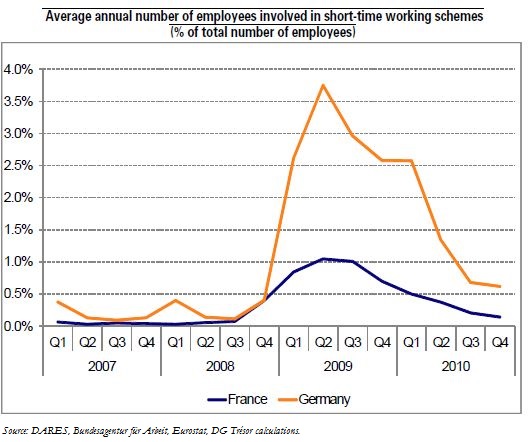Trésor-Economics No. 107 - Short-time working schemes in France and Germany: how do they differ?
Large-scale use of short-time working (Kurzarbeit) is frequently advanced as an explanation of German jobs miracle («Jobwunder») during the crisis of 2008-2009. Germany succeeded in holding unemployment to 7.5%, a rise of just 0.2% between 2008 and 2009, whereas in France it rose by 1.6 points to 9.4% in 2009. This system concerned nearly 1.5 million salaried workers in Germany in 2009, as against 0.3 million employees covered by comparable schemes in France. The gross cost of these schemes is reckoned to be €10 billion in Germany, versus €1 billion in France, between 2007 and 2010.
The difference in the extent of recourse to short-time working between France and Germany arises primarily from the context of the German crisis and the structure of industrial employment. During the crisis, Germany experienced a steep fall in external demand (– 5.1% of German GDP in 2009, versus – 2.7% in France), essentially affecting industry, a major user of short-time working. Moreover, pre-crisis corporate finances were strong, skilled labour was in short supply, and the share of industrial employment in total employment was larger than in France. Germany employers therefore had a greater incentive to retain labour in the prospect of a rapid upturn.
The difference also arises from the complexity of the French scheme: the method of calculating benefits differs according to the size of the firm and the mechanism opted for (conventional or extended short-time working). This makes it hard for employers to predict the amount remaining to be paid by them. In Germany, the short-time working benefits (Kurzarbeitergeld) is consistent with conventional unemployment benefit rules, making the scheme more readily comprehensible. In France, the scheme would gain from greater legal security and from streamlining, to facilitate access to it in a downturn, for SMEs especially.
Lastly, differences may also have their roots in Germany's tradition of regulated and negotiated flexible working time, combining a range of internal flexibility tools, including time savings accounts, and the ability to reduce or extend working time within certain limits (Arbeitszeitkorridor). Another factor is the country's highly-decentralised labour relation, facilitating the widespread use of the Kurzarbeit system.
Neither country, however, makes much use of the period spent on short-time working to provide training for workers, perhaps due to the difficulty of coordinating periods of short-time working - which are unpredictable - with training activities, which demand some planning. However, reforms in Germany (in 2009) and France (in 2012) are attempting to overcome these difficulties.
While Kurzarbeit appears to have made a major contribution to curbing unemployment in Germany during the crisis, it is still too early to assess its impact on maintaining jobs in the longer term. In France, there is a case to be made for a radical overhaul of public schemes to support short-time working.
